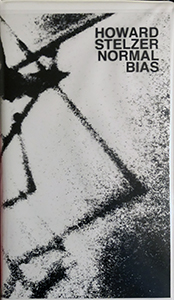 Having sat on these tapes for far too long, I felt that it was a good time to revisit them in light of Stelzer's newest works (reviewed here) to more fully recognize this legendary artist’s work. Dawn Songs is a pleasantly succinct piece of music that covers a nice gamut of sounds while Normal Bias is a sprawling, magnificent set of six tapes that feels like an "everything plus the kitchen sink" type release where everything just happens to be golden and indispensable.
Having sat on these tapes for far too long, I felt that it was a good time to revisit them in light of Stelzer's newest works (reviewed here) to more fully recognize this legendary artist’s work. Dawn Songs is a pleasantly succinct piece of music that covers a nice gamut of sounds while Normal Bias is a sprawling, magnificent set of six tapes that feels like an "everything plus the kitchen sink" type release where everything just happens to be golden and indispensable.
Dawn Songs is two side-long untitled pieces that are joined by the theme outlined in the title:All source materials were recorded between the hours of 4 and 6AM around Stelzer’s Lowell, Massachusetts home.A variety of tape treatments, field recordings, and ambient replications of sound were used.The first part is at first a thin wall of sustained noise that eventually builds in complexity, but stays consistent in volume, like the sound of silence pushed to the highest possible levels.This sound of pre-morning stillness is presented to the nth degree, eventually resembling jet engines and subsonic rumblings.Throughout Stelzer mixes things up from emphasizing the highest frequency sounds to the lowest, keeping an intense dynamic until ending on an open, spacious note.
On the other side, the mix has more breathing room that allows the lighter sounds to rise to the surface.Untreated field recordings of early morning bird songs shine through the simplified layers of sound and subtle environmental hiss.Eventually Stelzer shapes everything into a captivating series of noise waves that stretch out and then are peeled back, allowing bits and pieces to remain and allowing the focus to drift to the smaller, less demanding sounds.Eventually, like the previous half, the sound drifts away in the morning sunshine.
samples:
 

Normal Bias is less of a conceptually structured work, and that is by no means a detriment.At 18 copies, it is the largest release to date on Blake Edwards' (Vertonen) Ballast imprint, which I highly recommend as a whole for a multitude of handmade, conceptually brilliant releases.At six tapes, it covers that wide range of Stelzer's work, as well as some roads less traveled, and every moment of it is amazing.
Stelzer's early roots in the harsh noise underground are nicely represented throughout, most notably on "Basalt #1" (with Todd Bowser contributing bass guitar).A wall of noise is sustained throughout; some heavy low scrapes as well, which begins more aggressive than it ends.This unrelenting wall of noise never relents though, and the piece ends on what sounds like a poor bootleg of a rock show played too loudly by next door neighbors and a blasting fire alarm.The rough hewn edges of "Schist" hearken back to his oldest works, with a bit of that frigid, frozen sound akin to the golden age of Japanese noise artists (most notably the Incapacitants and Hijokaidan), with a bit of electronic drone deeply submerged in the mix.
Other tapes in this set are more focused on his penchant for complex tape edit collages."Detriment" is a mass of machine gun like sputters, brittle noises, and whirring helicopter blades that manages to sound both heavily composed and completely random, a juxtaposition that works perfectly."Basalt #2" is another chaotic mix of buzzing insects, random recorded voices giving announcements, field recordings and even some car horns in the distance."Night Light" (recorded live in Boston) captures the pre-show ambience of incidental sounds, strings, and conversations before launching right into Stelzer’s performance.Slowed, murky tape mutations, jerky cut and paste edits and uncomfortably lugubrious recordings all come together beautifully.
At other times on Normal Bias, Stelzer is even more adventurous than usual, which is saying a lot.A multitude of noises opens "Someday/It is Useful", and even a bit of what sounds like field recordings of Mr. Stelzer's classroom (his day job is being a fifth grade teacher) blended with guitar strums.Soon the piece transitions into a flowing mass of slowed down percussive rumbles, giving more of a rhythmic sense to the piece, but as a whole it is diverse and dynamic.There is a bleak murk throughout "Falling Action" that, with the added grinding and whooshing white noise layers, takes on a vintage industrial sheen that nicely complements his analog sensibility.
The contrast between the more succinct and conceptually focused Dawn Songs and the sprawling, gargantuan nature of Normal Bias is one that really does show the breadth and depth of Howard Stelzer's ever growing body of work.The former feels more structured and composed, while the latter is all over the place and adventurous, but without any missteps at all.While they may be a bit dated at this point, I highly recommend searching both out, as they are amazing and brilliant documents of the creative potential of one man and his many tape recorders.
samples:
 
Read More

